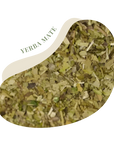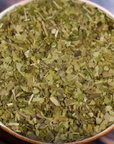

Yerba Mate Loose Tea
Yerba Mate Tea: A Functional Botanical for Gut Health, Antioxidant Defense, and Metabolic Support
Yerba mate (Ilex paraguariensis) is a revered herbal tea native to South America, traditionally consumed in countries like Argentina, Brazil, and Paraguay. More than just a cultural staple, yerba mate is now recognized globally for its rich profile of bioactive compounds and impressive health-promoting effects.
This tea contains a variety of functional constituents, including
-
Methylxanthines (e.g., caffeine, theobromine) —for energy and thermogenesis
-
Polyphenols and phenolic acids—for antioxidant and anti-inflammatory support
-
Triterpenes and saponins—for immune and metabolic modulation
Antioxidant & Cellular Protection
Extensive analysis of yerba mate has identified key antioxidant compounds such as
-
Chlorogenic acid
-
Caffeic acid
-
Rutin
-
Quercetin
These powerful antioxidants help neutralize free radicals, reduce inflammation, and protect tissues from oxidative stress.
Yerba mate has also been shown to increase endogenous antioxidant enzyme activity, specifically:
-
Catalase—helps decompose hydrogen peroxide (H₂O₂), a harmful byproduct of oxidative stress, protecting cells, tissues, and organs
-
Superoxide Dismutase (SOD)—converts superoxide radicals into H₂O₂, which catalase then breaks down
-
MnSOD (Manganese Superoxide Dismutase)—found in the mitochondria, this enzyme plays a critical role in protecting the body from oxidative damage by converting superoxide anion (O₂⁻) into less harmful compounds like hydrogen peroxide and oxygen
Together, these mechanisms make yerba mate a potent cellular protector, helping guard against DNA damage, tissue breakdown, and premature aging caused by reactive oxygen species (ROS).
Gut Microbiota and Anti-Inflammatory Effects
Yerba mate is particularly rich in phenolic compounds, which have been found to:
-
Modulate the gut microbiota by promoting beneficial bacteria
-
Support microbial diversity and enhance short-chain fatty acid (SCFA) production
-
Strengthen the gut barrier and reduce gut-derived inflammation
-
Positively influence the gut-liver axis for improved metabolic regulation
Research published in Foods (2021) highlights yerba mate’s unique ability to stimulate the microbiome and reduce markers of systemic oxidative stress and inflammation.
Metabolic and Weight Support
Yerba mate has also been studied for its anti-obesity and metabolic benefits, including
-
Enhanced fat oxidation and thermogenesis
-
Appetite regulation and delayed gastric emptying
-
Lowering of blood glucose, triglycerides, and LDL cholesterol
These benefits are achieved through the synergy between methylxanthines and polyphenols, supporting the body’s natural ability to manage weight, blood sugar, and lipid metabolism.
How to Use Yerba Mate:
For general wellness: Drink 1–2 cups daily (8–16 oz), hot or iced
For targeted metabolic/gut support: Up to 3 cups daily, as tolerated
Preparation: Steep 1–2 teaspoons in water 160–180°F (not boiling) for 5–7 minutes
⚠️ Avoid consuming late at night due to natural caffeine content
🚫 Not recommended during pregnancy or breastfeeding unless advised by a healthcare provider
Conclusion:
Yerba mate is more than an energizing tea—it’s a functional, bioactive beverage with scientifically validated benefits for the gut microbiome, mitochondrial protection, oxidative stress reduction, and metabolic regulation.
Whether you’re looking to support detox, digestion, or daily vitality, yerba mate offers a natural, time-honored solution with deep roots in traditional medicine and growing support in clinical science.

What is the role of phenolic compounds of yerba mate (Ilex paraguariensis) in gut microbiota?
These statements have not been evaluated by the Food and Drug Administration. The information was taken from clinical studies. These products are not intended to diagnose, treat, cure, or prevent any disease.



